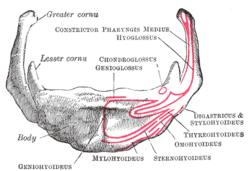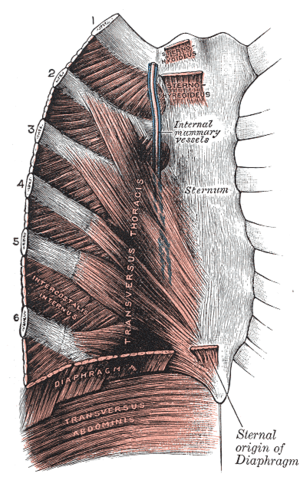Sternohyoid muscle
| Sternohyoid muscle | |
|---|---|
|
Muscles of neck. Sternohyoideus labeled at middle, just to the right of thyroid cartilage. | |
 Muscles of the neck. Lateral view. Sternohyoid muscle labeled | |
| Details | |
| Origin | manubrium of sternum |
| Insertion | hyoid bone |
| Artery | superior thyroid artery |
| Nerve | C1-C3 by a branch of ansa cervicalis |
| Actions | depresses hyoid |
| Identifiers | |
| Latin | musculus sternohyoideus |
| Dorlands /Elsevier | m_22/12550951 |
| TA | A04.2.04.002 |
| FMA | 13341 |
The sternohyoid muscle is a thin, narrow muscle attaching the hyoid bone to the sternum, one of the paired strap muscles of the infrahyoid muscles serving to depress the hyoid bone. It is innervated by the ansa cervicalis.
The muscle arises from the posterior border of the medial end of the clavicle, the posterior sternoclavicular ligament, and the upper and posterior part of the manubrium sterni.
Passing upward and medially, it is inserted by short tendinous fibers into the lower border of the body of the hyoid bone.
Variations
Doubling; accessory slips (Cleidohyoideus); absence.
It sometimes presents, immediately above its origin, a transverse tendinous inscription.
Additional images
 Posterior surface of sternum.
Posterior surface of sternum. Left clavicle. Inferior surface.
Left clavicle. Inferior surface. Hyoid bone. Anterior surface. Enlarged.
Hyoid bone. Anterior surface. Enlarged. Section of the neck at about the level of the sixth cervical vertebra.
Section of the neck at about the level of the sixth cervical vertebra. Posterior surface of sternum and costal cartilages, showing Transversus thoracis.
Posterior surface of sternum and costal cartilages, showing Transversus thoracis. The fascia and middle thyroid veins. The veins here designated the inferior thyroid are called by Kocher the thyroidea ima.
The fascia and middle thyroid veins. The veins here designated the inferior thyroid are called by Kocher the thyroidea ima.- Sternohyoid muscle
- Sternohyoid muscle
- Sternohyoid muscle
- Sternohyoid muscle - lateral view
- Sternohyoid muscle - right view
- Sternohyoid muscle
- Muscles, nerves and arteries of neck.Deep dissection. Anterior view.
References
This article incorporates text in the public domain from the 20th edition of Gray's Anatomy (1918)
External links
- Anatomy photo:25:10-0103 at the SUNY Downstate Medical Center - "Nerves and Vessels of the Carotid triangle"
- PTCentral